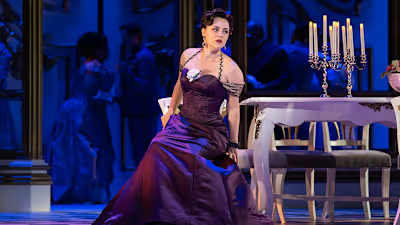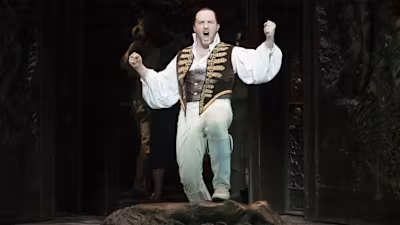Boy Meets Girl, Girl Meets Tragic End
Get out the handkerchiefs, folks. In the world of tragic love stories, opera takes no prisoners. Take a look at two of opera’s most heart-wrenching romances. Make sure you have a shoulder to cry on.
La Traviata (The Wandering One) by Giuseppe Verdi
Boy meets Girl, Girl leaves Boy, Boy and Girl reunite under tragic circumstances
Violetta is as carefree as a woman can get. She lives in Paris, has tons of admirers, hosts fabulous parties every night and refuses to let her failing health bother her. All of this changes, however, when she meets Alfredo, a young man who is helplessly in love with her. Suddenly realizing there is more to life than drinking and dancing, she decides to run away with Alfredo to the countryside.
A happy ending for our heroine, yes? Sadly not. Soon, Alfredo’s father finds her and begs her to leave his son, as their love affair has caused a bit of a scandal. Knowing her health is getting worse and she will most likely die without Alfredo, Violetta agrees to leave for the sake of respectability. Alfredo, not knowing any of this, discovers Violetta has left and immediately assumes she has gone to Paris to be with another man. In a jealous rage, he follows her into the city, humiliates her in front of all of her friends, and leaves her, heartbroken and alone.
Months later, Alfredo learns the truth and rushes back to Violetta, only to discover she is dying. In their last moments together, Violetta and Alfredo fantasize about returning to the country, but it is, of course, too late. She collapses dead in his arms as the curtain falls. Welcome to the world of tragic opera.
La traviata – Addio, del passato (Ermonela Jaho, The Royal Opera)
La traviata – Addio, del passato (Ermonela Jaho, The Royal Opera)
La Bohème (The Bohemians) by Giacomo Puccini
Boy meets Girl, Girl meets fateful end
Poet Rodolfo and artist Marcello live together in a dusty attic in Paris. They don’t have much money, but they seem pretty happy with their bohemian lifestyle; Marcello paints for a fee, Rodolfo writes plays that no one reads. Things seem to brighten up for them on Christmas Eve, when Marcello reunites with his on-again-off-again girlfriend, Musetta, and Rodolfo meets a beautiful seamstress, Mimì, with whom he falls instantly in love. Life seems perfectly happy-go-lucky for these four friends.
Weeks later, though, Rodolfo and Mimì have split up, despite the fact they seem so perfect for one another. Mimì meets with Marcello to ask for his help. Rodolfo, she says, has become insanely jealous, and has forced her to leave him. She can’t understand it, and neither can Marcello. The painter confronts Rodolfo, saying Mimì is too sweet to give him any reason to be jealous.
Rodolfo, unaware Mimì is listening in the shadows, admits he pushed Mimì away because she is very ill and his impoverished way of life is killing her. Mimì, devastated to learn she is dying, walks in on the conversation and tells Rodolfo she will now leave him for good. But Rodolfo begs her forgiveness, asking her to stay with him at least until the spring.
When spring arrives, Rodolfo and Marcello are once again alone in their little apartment. Mimì has run off, and Musetta has left Marcello for someone else. Just as the men are beginning to forget their troubles, Musetta rushes in with Mimì. Mimì, Musetta explains, is deathly ill, but she wants desperately to be near Rodolfo. Mimì and Rodolfo admit to themselves they have always loved each other and, with her friends surrounding her, Mimì peacefully passes away. Grief-stricken, Rodolfo cries out the name of his lost love. Tissues anyone?
La bohème - Act IV Finale (Dmytro Popov and Maija Kovalevska, The Royal Opera)
La bohème - Act IV Finale (Dmytro Popov and Maija Kovalevska, The Royal Opera)
Opera’s Romantic Comedies
Sometimes love can be ridiculous. Opera composers know that better than anyone. After all, it’s easier to laugh at fools in love when there’s a musical soundtrack involved. In addition, opera’s romantic comedies are often filled with silly disguises and outrageous misunderstandings. The following stories are no exception. Take a look at the lighter side of operatic love.
L’Elisird’Amore (The Elixir of Love) by Gaetano Donizetti
Boy tries desperately to get Girl’s attention with help of “magic” potion
Nemorino doesn’t stand a chance with Adina. He’s just a lowly peasant and she’s the brightest, prettiest girl in the village. When an army sergeant strolls into town and tries to claim Adina for himself, Nemorino decides he’ll need a miracle if he’s ever going to win Adina’s heart.
It looks as though his prayers have been answered when a flashy salesman called Dr. Dulcamara rides in, claiming he can sell Nemorino a magic elixir that will make any woman fall in love with him. (The potion is really only wine, but, hey, Nemorino is desperate.) The peasant spends everything he has on the mysterious elixir (and keeps getting more and more drunk in the process), but things don’t seem to work. Adina is still as distant as ever.
Totally confused, Nemorino joins the army to use the enlistment money to buy more potion. As he wanders about with his last bottle of elixir, Adina interrupts him. Turns out she’s loved him all along and has paid his debt so he won’t have to go off to the army. The elixir of love kind of worked after all! In the final scene, Nemorino and Adina joyously wave goodbye to Dr. Dulcamara and praise his now infamous “potion.”
L'Elisir d'Amore: Act II Duet -- Matthew Polenzani & Anna Netrebko (Met Opera)
L'Elisir d'Amore: Act II Duet -- Matthew Polenzani & Anna Netrebko (Met Opera)
Così fan Tutte (Women Are Like That) by Wolfgang Amadeus Mozart
Boys test Girls’ fidelity, Girls fail miserably
Stay focused, as this one gets a bit tricky.
Ferrando and Guglielmo are absolutely certain their girlfriends, sisters Dorabella and Fiordiligi, are the most loyal girls in town. So certain, in fact, they’re willing to bet on it. As part of a wager with their friend, Don Alfonso, they conspire to put their loves to the test by pretending to go off to war and then disguising themselves as “Sempronio” and “Tizio” in order to pursue each other’s girl. Think Wife Swap, eighteenth-century style. What can possibly go wrong?
Well, everything actually. Though Dorabella and Fiordiligi are unresponsive to these “new” suitors at first, their feisty maid, Despina, reminds them that life is too short to say no to a man, and they soon fall hopelessly in love with their opposite partners. Just as the girls are about to marry their latest boyfriends, Ferrando and Guglielmo reveal their disguises and furiously accuse the sisters of being unfaithful.
At this point, Don Alfonso gently reminds the men that all women are bound to be disloyal at some point, and the best way to be happy in love is to not take things too seriously. This lesson learned, Ferrando and Guglielmo decide to marry their original girlfriends in one big happy finale.
Così Fan Tutte: Act II Larghetto
Così Fan Tutte: Act II Larghetto
Opera’s Bittersweet Romances
Ever had your heart broken and then mended in the same day? Opera knows that feeling. Many operas celebrate the “in betweens” of love—the sketchy grey area between sorrow and joy. That’s what the following operas are like. They aren’t entirely depressing, but they’re not a barrel of laughs, either.
Der Rosenkavalier (The Cavalier of the Rose) by Richard Strauss
Boy meets Older Woman, leaves her when he meets Young Girl
Count Octavian is really in love with the Princess of Werdenberg. No, really. Even though she’s a bit older, and even though she keeps insisting that one day he’ll find someone new, he knows he’ll never leave her. Never, that is, until she sends him on a traditional mission to present a silver rose to Sophie, a young noblewoman who is about to be married to an elderly baron.
When Octavian meets Sophie, he’s instantly smitten. Sophie is the new love of his life., Theand the young girl feels the exact same way, of course. Plus, she can’t stand the baron, who’s extremely rude and horrible. Octavian therefore decides to do everything in his power to free Sophie from her engagement.
Thanks to an elaborate plot involving mistaken identity and a lot of wine, Octavian successfully humiliates the baron in front of Sophie, her father, and a policeman. It now seems as though the marriage will never happen. However, the baron puts up a bit of a fight and refuses to let Sophie go so easily.
Octavian is devastated. Who can solve his problems for him? The Princess of Werdenberg, that’s who. At this crucial moment, the princess walks in on the chaotic situation, only to order the baron to stand down and let Octavian marry Sophie. Octavian is instantly reminded of all of the empty promises he made to the princess, but she insists he be with his new love. Octavian and Sophie rejoice in their new happiness, and the princess walks out alone, content with the great sacrifice she has made. Talk about a bittersweet ending.
Der Rosenkavalier: "Hab mir's gelobt" (Fleming, Schäfer, Graham)
Der Rosenkavalier: "Hab mir's gelobt" (Fleming, Schäfer, Graham)
Turandot by Giacomo Puccini
Boy meets Girl, Girl threatens to cut Boy’s head off if he can’t answer three riddles
Princess Turandot of China has some major commitment issues. Apparently, one of her ancestors, Princess Lou-Ling, was murdered by an evil man who conquered her kingdom many years ago. Thanks to this, Turandot has sworn off men. She even forces any man who wants to marry her to try and answer three impossible riddles. If he answers correctly, she will reluctantly offer him her hand. If not, she has her henchmen cut off his head. Dozens of men have tried and failed, and the cemeteries are getting pretty full. Turandot’s starting to get a reputation as a bit of a tyrant.
This doesn’t stop Calaf, an exiled prince, from attempting to solve Turandot’s riddles, however. He takes one look at the princess and decides her beauty is worth dying for, despite the fact that his father, the former Emperor Timur, and his faithful and beautiful servant, Liù, beg him to reconsider. Calaf is certain love will provide him with the answers to Turandot’s famous enigmas. Let’s just say he isn’t the brightest of heroes.
Inside the palace, Turandot presents Calaf with three questions that are “less clear than smoke” and “less soft than iron.” Miraculously, Calaf is able to answer all three without difficulty. Horrified, Turandot begs her father, the Chinese Emperor, not to make her marry this stranger. Calaf offers a bargain; he will release her from her promise of marriage and allow himself to be executed if she can discover his real name, which he has kept a secret. Turandot resolves that no one in the kingdom will sleep until they discover the stranger’s identity, but Calaf is again confident that love will save him.
Despite Turandot’s violent efforts, no one is able to uncover the stranger’s secret. Turandot even tortures the slave, Liù, in an attempt to force her to reveal her master’s name. Liù, hopelessly in love with Calaf, decides to kill herself rather than betray him. After the death of his beloved servant, Calaf angrily confronts the princess, telling her that her reign of terror must end and she will eventually be softened by love.
Suddenly, Turandot loses control and bursts into tears. She admits her icy heart has melted and she has fallen in love with the stranger in spite of herself. The princess then announces to her kingdom she has discovered the stranger’s name: “His name,” she cries, “is Love!” As dawn breaks, Calaf and Turandot celebrate a new era of peace in China.
Turandot: Finale (Met Opera)
Turandot: Finale (Met Opera)
Like this project
Posted Apr 17, 2024
Opera has always been addicted to love, and its romances can range from the hilarious to the dramatic. But don’t expect a standard “Boy Meets Girl” story when …
Likes
0
Views
7





